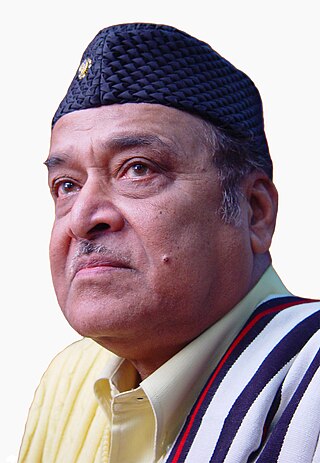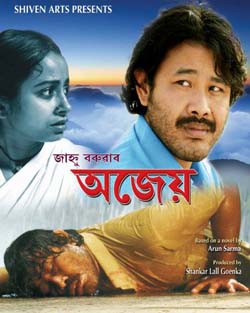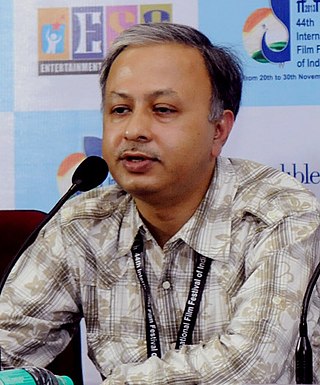Related Research Articles

Assam is a state in northeastern India, south of the eastern Himalayas along the Brahmaputra and Barak River valleys. Assam covers an area of 78,438 km2 (30,285 sq mi). It is the second largest state in northeastern India by area and the largest in terms of population, with more than 31 million inhabitants. The state is bordered by Bhutan and Arunachal Pradesh to the north; Nagaland and Manipur to the east; Meghalaya, Tripura, Mizoram and Bangladesh to the south; and West Bengal to the west via the Siliguri Corridor, a 22-kilometre-wide (14 mi) strip of land that connects the state to the rest of India. Assamese and Boro are the official languages of Assam. Meitei (Manipuri) is the official language of Hojai district and the entirety of the Barak Valley region, while Bengali is an official language in the three districts of Barak Valley.

Bhupen Hazarika was an Indian playback singer, lyricist, musician, poet, actor, artist, editor, filmmaker, professor and politician from Assam, widely known as Sudha Kontho. His songs were written and sung mainly in the Assamese language by himself, are marked by humanity and universal brotherhood and have been translated and sung in many languages, most notably in Bengali and Hindi.

Assamese cinema is the Indian film industry of Assamese language. It is based in Assam, India. The industry was born in 1935 when Jyoti Prasad Agarwala released his movie Joymoti. Since then the Assamese cinema has developed a slow-paced, sensitive style. In the beginning the industry were called Jollywood, for Agarwala's Jyoti Chitraban Film Studio.
Bhabendra Nath Saikia was a novelist, short-story writer, editor and film director from Assam, India. Saikia received his doctorate in physics from the University of London. He began his career as a reader in the Department of Physics, University of Guwahati. He later played an important role in the publication of college level textbooks in the Assamese language during his tenure as the Secretary of the Co-ordination Committee for production of textbooks in regional languages.

Zerifa Wahid is an Indian actress known for her works in Assamese films. Her prominent features include Baandhon, which won the 60th National Film Awards for Best Feature Film in Assamese directed by Jahnu Baruah. and the best film in the Indian Films Competition held at the Bengaluru International Film Festival for the year 2012.

Prof Bhabananda Deka was a pioneer Assam economist and author who conducted novel research on the economy of the far eastern part of India. He was also a leading Indian-Assamese litterateur of the famed 'Awahon-Ramdhenu Era' of Assamese literature during the mid-20th century. He was the author of a total of 115 English and Assamese books including textbooks on a range of fifteen subjects including economics, ancient Assamese literature, philosophy, education, religion, mythology, archaeology, tribal study, poetry, drama, memoirs, civics, political science, biographies; he also edited books and journals. He also authored a variety of research papers and articles about the state of Assam, a state in the north-eastern part of India. He pioneered the writing of books on Economics in Assamese. His Assamese book Axomor Arthaneeti was the first ever research-based comprehensive book on Assam Economics, which was published for the first time in 1963. He was conferred with the honorary title of 'Asom Ratna' -- 'Jewel of Assam' by the intellectuals of Assam on 19 August 2007 at a public meet held under the presidency of Prof. (Dr) Satyendra Narayan Goswami.

Arun Sarma was a writer of Assam. Arun Sarma was one of Assam's contemporary playwrights and is particularly known for his unconventional plays with some elements of drama. Besides drama, he also authored over six novels detailing the Assamese way of life. He was awarded the Padma Shri in 2010 in recognition of his contributions to Assamese literature. He has also been awarded the Sahitya Akademi Award in 1998 for the novel Ashirbadar Rong. He has won the Asam Sahitya Sabha's Best Playwright Award for two consecutive years and also has the rare distinction of having won the Sangeet Natak Akademi award in 2003 for his contributions to drama and the Sahitya Akademi award in 1998 for literature. He was also the recipient of the Assam Valley Literary Award in 2005.

Kopil Bora is an Assamese actor, anchor and All India Radio voice artist. He debuted in Bidyut Chakravarty's 2002 Assamese film Gun Gun Gane Gane and known for his performance in Mon (2002), Ahir Bhairav (2008), Jetuka Pator Dore (2011) and Dwaar (2013).

Jim Ankan Deka is an Indian musician, documentary film maker, photographer and director of Bangalore based organisation and music school Eastern Fare Music Foundation. He is the first person from Assam to open a music institute and a production house in Bangalore, India. He won multiple awards for his song Aawaz - speak up against sexual violence based on the 2012 Delhi gang rape incident.

Khandkar Mohammad Adil Hussain is an Indian actor who is known for his work in several Indian independent and mainstream film productions, as well as international cinema, in films such as The Reluctant Fundamentalist and Life of Pi . He received National Film Awards at the 2017 National Film Awards for Hotel Salvation and Maj Rati Keteki.

Imran Shah, also known as Nawab Imran Shah is an Indian Assamese language writer, poet, novelist, and scholar. He also writes under the pen names Ishan Dutta, Anamika Baruah, Kumbhakarna, and Animesh Baruah. The Government of India awarded him the fourth highest civilian honour of the Padma Shri, in 2021, for his contributions to literature and education.

Borolar Ghor is a 2012 bilingual Assamese-Bengali romantic comedy film starring Utpal Das and Debasmita Banerjee in the lead roles. The film was directed and produced by Mani C. Kappan under the banner of Okay Productions. This film was the remake of 1993 superhit Malayalam film Meleparambil Aanveedu, which was also produced by Kappan under the same production house. Noted Assamese filmmaker Manju Borah acted as an advisor in the film.

Ekhon Nedekha Nodir Xhipare is a 2012 Assamese language socio-political thriller film, with some dialogue in Hindi, starring Sanjay Suri and Bidita Bag in the lead roles. It was directed by Bidyut Kotoky and produced by National Film Development Corporation of India. The film was simultaneously made in Hindi as As the river flows.

Ajeyo is a 2014 Assamese language drama film directed by Jahnu Barua; based on the Sahitya Akademi Award winner 1997 Assamese novel Ashirbador Rong written by Arun Sharma and adapted as screenplay by the director himself. It was produced by Shankar Lall Goenka and stars Rupam Chetia and Jupitora Bhuyan in the lead roles. The film was released on 3 January 2014.
Rajni Basumatary is an Indian filmmaker and actress, best known for her role of Mary Kom's mother in the 2014 Hindi film Mary Kom. Basumatary has written and produced the highly acclaimed feature film Anurag. Her directorial debut Raag was released in all major cities in India in 2014.
Prodyut Kumar Deka is an Indian film & stage director, screenwriter and author residing in Assam, India. His films include Dhunia Tirutabur, Samiran Barua Ahi Ase, Surjasta, Borosi, Chiyahir Rong, Ji Golpor Ses Nai and The Government Servant. He turned to writing english fiction gradually from 2016-17 with the anthropological Ambari Series based on the Ambari Archeological site in Guwahati.

Utpal Borpujari is a double National Film Award winner; one, as a film critic, and the other, as a filmmaker. In 2003, he won the Swarna Kamal for Best Film Critic at the 50th National Film Awards of India. In 2018, he won the National Film Award, and 5 Assam State Film Awards for his debut feature film Ishu
References
- ↑ "ASFFDC - Right To Information". Archived from the original on 4 March 2016. Retrieved 4 January 2016.
- ↑ "Post 'Baandhon', ASFFDC plans to revive Assam film industry". Business Standard . Panaji. Press Trust of India. 21 November 2012. Retrieved 4 January 2016.
- ↑ "Film body works on returns". The Telegraph. Guwahati. 27 November 2014. Archived from the original on 29 November 2014. Retrieved 6 January 2016.
- ↑ Kaushik, Divya (20 September 2014). "True to his Salt". Daily Pioneer. Retrieved 4 January 2016.
- ↑ "People will go to theatres if quality of films improve: Adil". Business Standard. Guwahati. Press Trust of India. 17 December 2015. Retrieved 4 January 2016.